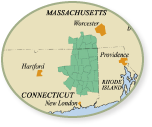Bill Hull: A conservation leader in The Last Green Valley
Saturday is the birthday of renown conservationist Aldo Leopold. He was a scientist, ecologist, forester, author and environmentalist and is best known for his book “A Sand County Almanac.” In his chapter “The Land Ethic,” Leopold wrote “the land ethic simply enlarges the boundaries of the community to include soils, water, plants and animals or collectively: the land… In short, a land ethic changes the role of Homo sapiens from conqueror of the land-community to plain member and citizen of it. It implies respect for his fellow-members and also respect for the community as such.”
I read “A Sand County Almanac” many years ago and frequently return to it for inspiration. Leopold’s direct and simple descriptions of the natural world he observed and experienced throughout his life show a profound understanding of nature, an appreciation for wilderness and our impact on natural systems. Aldo Leopold died in 1948 and is considered one of the pillars of the 20th century conservation and environmental movement.
Bill Hull, founder of Hull Forest Products, Inc., is the 2019 recipient of the first annual New England Leopold Conservation Award. The prestigious award recognizes extraordinary achievement in voluntary conservation and management of natural resources. The award is given by the Sand County Foundation with support from New England Forestry Foundation and the American Farmland Trust-New England.
Hull founded his company to preserve working forests, grow trees, and manufacture wood products and sustainable building materials. Hull has acquired and protected more than 27,000 acres of forestland in southern New England with a dedication to conserving working forests that also provide bird and wildlife habitat and biodiversity across New England. There is a direct link between the work of Aldo Leopold and that of Bill Hull. The land ethic so clearly espoused by Leopold decades ago is alive and well in Bill Hull and his dedication to land conservation.
I spoke with Bill about his years of experience conserving land and his work with Hull Forest Products in Southern New England and here in The Last Green Valley.
Bill is a forester and owner of an important forest products business with an impact well beyond the 35 town National Heritage Corridor. He is an entrepreneur with a business model that needs trees. Trees take years to grow to the size and value needed for market, and to guarantee that wood would be available for his company to prosper, he knew that owning land was the best long-term business model for him.
He acquired his first property at the age of 15, and his love of the land and its forests is still the heart of his life’s work. Since that early age, Bill has acquired 27,000 acres and has protected them with conservation easements (also known as conservation restrictions). That way he still owns the land and can grow trees for his business, but the land is restricted against development and will remain intact forest in perpetuity.
Of all the land he owns, Bill said his favorite is the Myers Pond parcel of 450 acres in Union, which was not a surprise to me. The parcel had originally been owned by George Hewitt Myers and retained by him after Myers donated thousands of acres of adjacent lands to Yale University. Today the Yale-Myers Forest is a contiguous 7,800 tract of forest owned by Yale University and managed by the Yale School of Forestry and Environmental Studies.
Bill had known about the property since the late 1960s, and he knew it was still privately owned. For several years he kept regular contact with the landowners and eventually, by partnering with The Nature Conservancy and Yale University, he was able to acquire the land.
I toured the property during a TLGV Walktober walk led by Hull Forest Products’ forester Mike Bartlett and heartily concur it is a very special place. Along with extensive forested land, there are four ponds, streams and exceptional hillside views to the west. The property must have had special meaning to George Hewitt Myers, since he, along with his wife and three daughters, are buried in a small graveyard on the side of the hill. Thanks to Bill Hull this special place will be protected in perpetuity
When Hull’s Leopold Award was announced it came with a beautifully done short film about Bill, his life work with Hull Forest Products and his conservation ethic. You can find this film by going to the following link:
https://www.youtube.com/watch?v=mOvW6StIZ6c
The award also came with a $10,000 cash prize. Bill used some of that money to purchase copies of “A Sand County Almanac.” He handed them out free of charge to those who visited Hull Forest Products during their Oct. 19 Open House that was part of TLGV’s Walktober program. The tour was so well attended that all the copies were gone by the end of the day. It was a perfect way to spread the word about Aldo Leopold and the land ethic he so clearly espoused, that Bill has carried forward these many years.
To fully understand the work and sustainable forestry practices of Bill Hull and his colleagues check out the company website at:
I enjoyed speaking with Bill to learn more about his work and all that inspires him to conserve and care for our region’s forestlands. He understands that special sense of place found in the rural character of our region. He is glad to play a role in conserving land here in The Last Green Valley. I hope you will join Bill Hull and so many others, as together we work to care for, enjoy and pass on The Last Green Valley National Heritage Corridor.
Bill Reid is the Chief Ranger of The Last Green Valley National Heritage Corridor and has lived in the region for more than 35 years. He can be reached at bill@tlgv.org
Get Connected
Sign up for our newsletter



